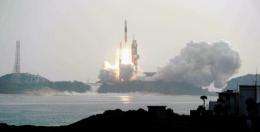A H-IIA rocket is pictured leaving the launching pad at Tanegashima Space Center in Tanegashima island, Kagoshima Prefecture, in May. Japan on Saturday will launch a similar rocket that will carry a satellite intended to improve global positioning systems.
Japan on Saturday launched a rocket carrying a satellite intended to improve global positioning systems.
The H-IIA rocket blasted off at 8:17pm (1117 GMT) from the Tanegashima space centre in southern Japan, according to the Japan Aerospace Exploration Agency (JAXA).
About 30 minutes after the launch, the rocket successfully released the "Michibiki" satellite, whose name means "showing the way".
JAXA scientists hope the satellite will boost the accuracy and coverage of GPS, which is widely used in Japan by drivers.
Currently, radio waves from a satellite can be hampered by skyscrapers or mountains, and significant errors can be also caused by reflected waves, according to JAXA.
The Japanese space agency hoped to launch three such satellites, meaning that one of them would always be above Japan, but budgetary constraints have stalled plans for the second and third satellites, local media have said.
(c) 2010 AFP






















